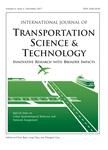Fuel Economy Impacts of Manual,Conventional Cruise Control,and Predictive Eco-Cruise Control Driving
作者机构:Department of Civil EngineeringChosun University 309 Pilmun-daero Dong-gu Gwangju 501-759South Korea Center for Sustainable MobilityVirginia Tech Transportation Institute 3500 Transportation Research PlazaBlacksburgVA 24061 Nokia Location and Commerce 425 West Randolph StreetChicagoIL 60606
出 版 物:《International Journal of Transportation Science and Technology》 (交通科学与技术(英文))
年 卷 期:2013年第2卷第3期
页 面:227-242页
学科分类:082304[工学-载运工具运用工程] 08[工学] 080204[工学-车辆工程] 0802[工学-机械工程] 0823[工学-交通运输工程]
摘 要:The paper presents the results of a field experiment that was designed to compare manual driving,conventional cruise control(CCC)driving,and Eco-cruise control(ECC)driving with regard to fuel *** field experiment was conducted on five test vehicles along a section of Interstate 81 that was comprised of±4%uphill and downhill grade *** an Onboard Diagnostic II reader,instantaneous fuel consumption rates and other driving parameters were collected with and without the CCC system *** collected data were compared with regard to fuel economy,throttle control,and travel *** results demonstrate that CCC enhances vehicle fuel economy by 3.3 percent on average relative to manual driving,however this difference was not found to be statistically significant at a 5 percent significance *** results demonstrate that CCC driving is more efficient on downhill versus uphill *** addition,the study demonstrates that an ECC system can produce fuel savings ranging between 8 and 16 percent with increases in travel times ranging between 3 and 6 *** benefits appear to be largest for heavier vehicles(SUVs).



